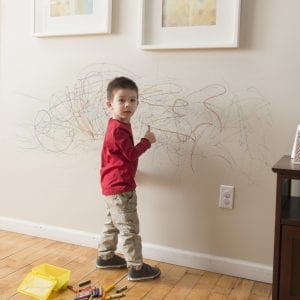Home & Family

The Principles of Parenting series introduces knowledge about child development and tips to support positive parenting and family relations.
One of the best things about being a parent is knowing that your baby or young child needs you. Even though it can be tiring, you feel good when you are able to take care of their needs. By the end of the first year, they will begin to develop new skills. Your child will become more self-reliant and often want to do more for themselves. Parents are often surprised and disappointed when their lovable, manageable baby turns into an independent, busy explorer who says “No!”
Even though your young child can do more things for themselves, they need you now as much as ever. Your young child needs you to firmly set limits for their behavior. They need your guidance to learn how to get along in the world. Setting limits and teaching young children to behave are skills you can learn. This publication will give you some tips for ways to discipline young children so they stay safe and learn to behave in socially acceptable ways.
What Is Good Discipline?
The word “discipline” actually means, “to teach.” The discipline you use to get your child to behave teaches them about themselves and about their relationships with you, a responsible adult. Structured discipline means setting consistent limits and rules, and helping a child learn how to do what is safe and expected. Fair discipline doesn’t punish a child for making mistakes. It teaches them how to respond appropriately to the best of their ability. Loving discipline means that you are right there with them, helping them do the right thing.
Some people feel as though discipline means spanking or yelling unkind words to make children suffer enough so that they will never do wrong again. Unfortunately, this kind of discipline may teach a young child that threatening and hurting people is how to get them to do what you want. It may also teach a young child that their world is unsafe or unpredictable. Young children may also decide that as long as no-one is yelling at them, they can get away with doing wrong things.
Parents should understand that fair discipline teaches a child to behave, even when parents are not around, by showing them with love. They know that a child will be better behaved in the long run if parents act like caring “teachers” rather than angry “bosses.” They know that a child does not need to be taught who the boss is–they already know it is you, the parent they need, trust, and love. Instead, it is important for a child to know how to get along with other people. Your child will work very hard to please you when you treat them with love and respect while setting fair and firm limits on their behavior.
Getting Ahead: Making it Easy to be Appropriate
It is important to know what kinds of behaviors to expect from your child at different ages. Knowing what your child can and cannot do will help you be more understanding of some of the behaviors you see your child doing. The most important thing for you to remember is that the best way to help your young child be good is to make it easy. Here are some ideas that you can do to make it easy for your child to behave.
Making it Easy by Knowing What Is Reasonable to Expect
Babies cannot understand discipline. They know love and anger. The best way to set the stage for following rules when they are a little older is to show them that you are keeping them safe with love and firmness. This might mean strapping them into a car seat even when they are crying, but then giving them a kiss, and talking to them gently, but still keeping them in their seat. It means helping the baby adjust to discomfort. This teaches them that you make decisions that they might not like, but which are consistent and made with love. They learn to trust you.
Make it Easy by Making Safe and Interesting Spaces
Toddlers need more supervision as they begin to crawl and walk and develop more independence. They do not know or understand what is safe and unsafe. The first thing to attend to is to help keep the child stay safe by childproofing the home. Childproofing helps prevent battles over things children can’t understand yet.
Very young children are going to actively explore their surroundings, so give them simple safe things to explore. It is not reasonable to expect a young child to stay away from electrical outlets, cleaning supplies, or breakable dishes when they are just exploring.
When you say, “don’t touch” they don’t know why. A child this age also does not remember instructions very long. Using physical punishment, such as yelling or slapping, may stop a child of this age for a little while, but these actions do not teach children what is safe or unsafe. It also tells them that exploring and making mistakes is not okay.
A parent should help their child by removing forbidden objects. Cover electrical outlets. Put a gate in front of stairs. Keep breakable and dangerous things out of reach of your child.
Making it Easy by Keeping Them Busy in Fun Ways
Prechoolers love to help. They are busy, though, so be aware of what your child is doing and how they might get into trouble. For example, if you see your child moving toward an area you don’t want them to go in, step in and offer them a different activity. Another way to avoid trouble is to redirect your child from doing what you don’t want them to do. Show them a way to help, or another behavior or activity. For example, if you find your child putting something dirty in their mouth, give them a cracker, a teething ring, or a toy instead.
Using prevention and distraction will allow you to save the word “No!” for important times when your toddler or baby is in danger of hurting themselves or others.
Making it Easy by Being Positive
Using positive discipline means taking the time to praise their child when they behave positively. Parents that teach their child with plenty of positive attention may notice a decrease of misbehaviors. As a possible result of the positive and encouraging attention parents may see fewer discipline problems. Some people worry that too much positive attention will spoil children, but that isn’t true. Did anyone ever receive too much love?
Knowing What your Child Can Do
Appropriate Discipline for Toddlers
Children under three years of age do not understand rules in the way we understand them. They understand that right now, in the moment, what is happening is not okay. Parents can teach their children by being consistent, with simple rules, and helping children follow them. For example, you might say, “Don’t eat from the floor” and take something away that fell on the floor. For you, it is a rule, but for them, you are showing them the right way to do things. It is important for you to remember that children under three may not remember and follow these rules. You might have to remind them by gently showing them, “We don’t eat off the floor.”
Simple Rules for Preschoolers
Children who are three, four, and five are getting skills in using and understanding language. They are able to follow simple rules that you set.
At this age, children’s ability to remember things is improving. They can understand that when they break a rule or do something wrong, there is a consistent response from you. This is what rules mean to them. They might not understand why it is important to follow rules, though, other than to please you. Your child will begin to learn why good behavior is important if you take the time to briefly and calmly explain what the child has done wrong and show them the right way to act.
You can help your preschool aged child behave and follow rules by doing these things:
- Make simple rules and consistently follow through with them.
- Offer simple reasons for why misbehavior is not acceptable.
- Give children limited choices.
- Be a good example yourself.
Although toddlers’ speech and memory have developed more, remember that your child will understand better if you use simple words and sentences. Be clear and relate the rules to things they can understand.
- Don’t hurt others (or pets)
- We put away the toys before bedtime
- After lunch it is naptime
Being consistent will help you and them follow the rules better. Saying things like, “Because I said so!” teaches them that you are the Boss but it doesn’t tell them why something is wrong. Instead, guide simply and firmly. Give limited choices “Remember that after lunch, it is naptime. Do you want to put on your book or your toy?”
Choose your rules carefully! There is no point to having rules if you don’t have the energy to follow through
on them. Rules that you do not consistently follow is confusing to a young child. It may teach them to ignore rules and to ignore you.
Simple Rules and Appropriate Consequences
When your child misbehaves, match your response to the behavior. For example, if children are fighting over a toy, remove the toy. If a child spills a drink, they are more likely to learn if you help them clean up the mess than if you yell at them. These responses to unwanted behaviors make sense to a young child. Unlike yelling, rules don’t tell children they are bad, but that their behavior is not okay. Simple rules help children see the connections between actions and their consequences: Fighting about a toy leads to not having one to play with. Spilled juice takes time and effort to clean up.
Linking the consequences also helps a preschooler understand how their behavior affects others. For example, “When you hit Charles it hurts him a lot. He doesn’t want to play with children who hurt him.”
Show children an alternative. Show them how to use words to tell others that they are angry or jealous or frustrated. This kind of response gives your child important information. It teaches them how to recognize their feelings and how their actions affect others. It teaches them how to follow through appropriately and get along with others.
Being a Parent Means Trusting Children to Make Safe Choices
Sometimes young children misbehave because they need to feel like they have some control over what they can do. Parents can help their children by giving them some safe choices. Parents who do this know that children will be more willing to let parents have control over some things, if their children can have a say in other things.
For example, “Would you like to wear your green pants or your blue pants?” and “Would you like a sandwich for lunch or a hot dog?” Asking these type of questions gives good choices to your young child. When you offer your child safe choices, it helps them learn to have confidence and that you trust them. Choices give a child practice in making decisions for themselves.
Be the Person You Want Them to Be
Finally, children learn from watching the people around them, especially their parents. Parents need to try to
act the way they want their child to act. A child will pick up language, actions, and attitudes of their parents and imitate them. If you want your children to behave politely and to respect others, then you must set an example and behave politely and respect others, especially your children.
Parents Are Partners in Helping Children Behave
In a few short years, children grow from babies who are entirely dependent on their parents for their every need to talking, running, independent preschoolers. In spite of this rapid growth, young children are only beginning to develop the skills to control their behavior. They have a lot to learn about how to control themselves. You need to be your child’s partner in this process, patiently guiding and teaching as your child practices and develops these skills. Teaching young children how to behave is hard work. But the work you do now will pay off later in the form of children who are able to respond appropriately as caring people.
Read More
If you want to know more about alternatives to punishment, read:
- Something Better Than Punishment, HE-0687
If you have a baby who cries a lot, you may be interested in:
- Infant Crying: I’m Trying to Tell You Something, HE-0717
If you are worried about spoiling your child (being too permissive), read:
- Am I Spoiling My Child? HE-0718
Reflect:
What are my top three rules?
- _______________________
- _______________________
- _______________________
How do I teach these?
_________________________________________
_________________________________________
_________________________________________
What does my child do well? How can I show them I notice and praise them?
_________________________________________
_________________________________________
_________________________________________
_________________________________________
 Revised by Silvia Vilches, Extension Specialist and Assistant Professor in Family and Child Development, Synithia Flowers, Regional Extension Agent, and Kayla Campbell, Undergraduate Research Assistant, Human Development and Family Studies. Originally developed by W. Goddard, revised by Dr. E. Abell (2004) as part of the series Principles of Parenting.
Revised by Silvia Vilches, Extension Specialist and Assistant Professor in Family and Child Development, Synithia Flowers, Regional Extension Agent, and Kayla Campbell, Undergraduate Research Assistant, Human Development and Family Studies. Originally developed by W. Goddard, revised by Dr. E. Abell (2004) as part of the series Principles of Parenting.
Reviewed March 2023, New Principles of Parenting Series: Helping Young Children Behave, HE-0719






